

Our book group brings together foster carers and social workers. As part of a recruitment event for the Foster Care Co-operative for Foster Care Fortnight in May, I reached out to prospective and existing foster carers through a shared love of reading.
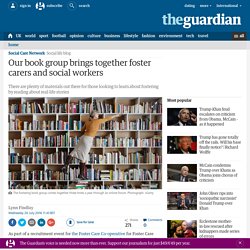
I decided to put together a fostering reading list and hold a book group at a recruitment event in Sheffield. On Twitter, I was quickly introduced to new ideas and authors by Steven Jones at JKP Books and Amanda Taylor, founder of the SocialWork BookGroup, which helps to spread the word about the group and the reading list. Amanda invited me to the Sheffield University book group, where they shared ideas about running a group. Following this research, the Foster Care Co-operative book group was launched with the aim of “learning about fostering through popular non-fiction”.
I have been overwhelmed by the interest from staff and foster carers across the agency and how many of us enjoy reading books written by foster carers and those who have been through the care system. Spoken Words: Hollie McNish on the need to get children out of the classroom – video. ART THERAPY + HAPPINESS PROJECT. May 2015 Trauma-Informed, Expressive Arts Therapy News In this Issue... 2015 ART THERAPY + HAPPINESS PROJECT begins in June!
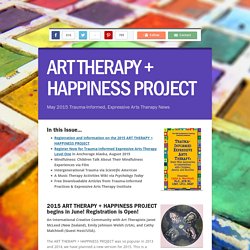
Registration is Open! An International Creative Community with Art Therapists Janet McLeod (New Zealand), Emily Johnson Welsh (USA), and Cathy Malchiodi (Guest Host/USA). The ART THERAPY + HAPPINESS PROJECT was so popular in 2013 and 2014, we have planned a new version for 2015. We believe that art making can make us "happier" through four positive forces that help us to be more resilient when challenged by life events, big and small.
This online interactive workshop will again focus around the four positive forces of wellbeing exploring new and old creative techniques. We are planning to open the course for participation in June 2015. How Schools Teach Traumatized Kids Who Struggle to Learn. When Kelsey Sisavath enrolled as a freshman at Lincoln Alternative High School in Walla Walla, Washington, in the fall of 2012, her mother was struggling with drug addiction.
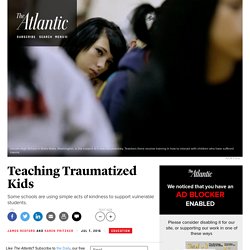
Kelsey herself was using meth. The multiple traumas in her life included a sexual assault by a stranger at age 12. She was angry, depressed, and suicidal. Her traumatized brain had little room to focus on school. Today, much has changed in Kelsey’s life. Unconditional Education Partnership. How Trauma-Informed Teaching Builds A Sense of Safety And Care. Third grade teacher Anita Parameswaran is no stranger to students who have experienced trauma.
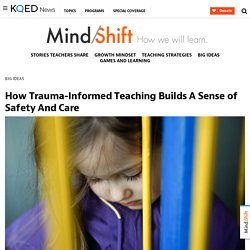
She has taught kids who have experienced the effects of abuse, neglect and divorce. She had one student experience a huge setback when he learned his father was arrested and sent to jail. The student then became violent, throwing things, and hurting other students, according to Parameswaran. Her main goal quickly became trying to keep him in class, whether or not he was able to engage fully in the activities. She would set short term goals, like focusing for 15 minutes. “It was really rough when he first learned about his father, but since then we’ve made strides,” Parameswaran said. The program works with schools to train teachers about the effects of trauma on the brain and behavior of children. Teachers across the country face similar issues when trying to teach students who have experienced extreme trauma or even the day-to-day stress of poverty.
Creative Interventions with Traumatized Children: Second Edition. A trusted, bestselling resource, this volume demonstrates a range of creative approaches for facilitating children's emotional reparation and recovery from trauma.
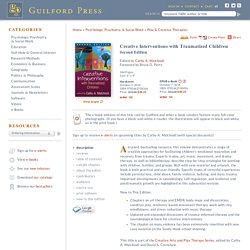
Experts in play, art, music, movement, and drama therapy, as well as bibliotherapy, describe step-by-step strategies for working with children, families, and groups. Rich with case material and artwork, the book is both practical and user-friendly. Specific types of stressful experiences include parental loss, child abuse, family violence, bullying, and mass trauma. Important developments in neurobiology, self-regulation, and resilience and posttraumatic growth are highlighted in this substantial revision. New to This Edition: ART THERAPY + HAPPINESS PROJECT.
GRIFFITH Postgraduate Social Work Courses in Australia Griffith University. Natured Kids Australia. Kids In Nature Network. Play Outside Australia. Nurture in Nature. About us - Leap into Nature.